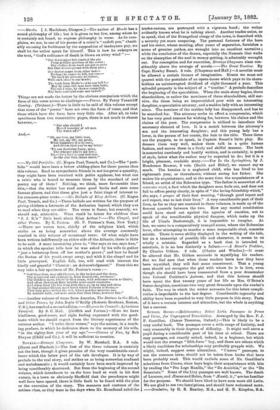Novi:La.—Strange Chapman. By W. Marshall, B.A. 3 vols. (Hurst and
Blackett.)—The first of the three volumes is certainly not the best, though it gives promise of the very considerable excel- lence which the latter part of the tale developes. It is by way of prelude to the real story, and strikes us as being somewhat confused and melodramatic ; it would certainly have been much improved by being considerably shortened. But from the beginning of the second volume, which introduces to us the hero hard at work in his first curacy, in a town so obviously Sheffield that the pseudonym might well have been spared, there is little fault to be found with the plan or the execution of the story. The manners and customs of the artisan class, as they Were in the days when Mr. Broadhead ruled the
trades-unions, are portrayed with a vigorous hand ; the writer evidently knows what he is talking about. Another trades-union, so to speak, that of the Evangelical clergy of the town, is described with a severity yet more unsparing. The personal fortunes of the hero and his sister, whose meeting, after years of separation, furnishes a scene of genuine pathos, are wrought into an excellent narrative ; while the conclusion of the drama, especially the Nemesis that waits on the absorption of the soul in money-getting, is admirably wrought out. For conception and for execution, Strange Chapman rises con- siderably above the average of novels.—The Great Tontine. By Capt. Hawley Smart. 3 vols. (Chapman and Hall.)—A. novelist must be allowed a certain licence of imagination. Hence we must not quarrel with the postulate of an opera-house which pays to its share- holders an uninterrupted dividend of eight thousand a year. This splendid property is the subject of a "tontine." A prelude describes the beginning of the speculation. When the main story begins, three shareholders, or rather the nominees of three shareholders, still sur- vive, the three being an impoverished peer with an interesting daughter, a speculative attorney, and a maiden lady with an interesting niece. The nominee of the maiden lady has disappeared, and has to be searched for. The attorney seeks to effect a compromise, which he has very good reasons for wishing for, between his claims and the claims of the peer. The compromise is utilised to introduce the necessary element of love. It is a match between the attorney's son and the interesting daughter; and this young lady has a lover, in the person of her cousin, the heir to the title. These three are the puppets, so to speak, in Captain Smart's little play. He dresses them very well, makes them talk in a quite human fashion, and moves them in a lively and skilful manner. The book is somewhat carelessly and hastily written, and is certainly, in point of style, below what the author may be expected to do; but it is a bright, pleasant, readable story.—For In the Springtime, by J. Henderson Browne, 3 vols. (Smith and Elder), we cannot say as mach. The heroine is a neglected child, who has lived to her eighteenth year, or thereabouts, without seeing her father. She makes his acquaintance, and at the same time the acquaintance of a friend, an artist of the Bohemian type. The father is somewhat of a mauvais sujet, a fact which the daughter soon finds out, and does not fail to affirm pretty clearly, in spite of "the loving friendship which," she says, a, propos of their first meeting, "through good report and evil report, was to last their lives." A very considerable part of their lives, as far as they are narrated in these volumes, is made up of the fiercest quarrels between the two. How any mortal constitution could have stood out against the agonies of emotion, not to speak of the considerable physical dangers, which make up the life of Ursula Desborough, it is impossible to imagine. At last, we come to a comparatively tranquil scene, where the Bohemian lover, after attempting to murder a more respectable rival, commits suicide. There is some ability displayed in the writing of the tale, but as a transcript of possible life and character, it seems to us wholly a mistake. Regarded as a book that is intended to entertain, it is no less distinctly a failure.—A Heart's Problem, By Charles Gibbon. 2 vols. (Chatto add Windas.)—It must be allowed that Mr. Gibbon succeeds in mystifying his readers. But we feel sure that when these readers learn how they have been mystified, they will feel some resentment. That a young man should not recognise the girl with whom he is in love, even though she should have been transmuted from a poor dressmaker into Colonel Cuthbert's ',heiress, and that this heiress should have spent the first twenty years of her life as Mrs. O'Brien's foster-daughter, constitute two very great demands upon the reader's faith. The way in which the writer accounts for this latter compli- cation is improbable to the last degree. Considerable ingenuity and ability have been expended to very little purpose in this story. Parts of it have a certain interest and attraction, but the whole is anything but a success.






































 Previous page
Previous page